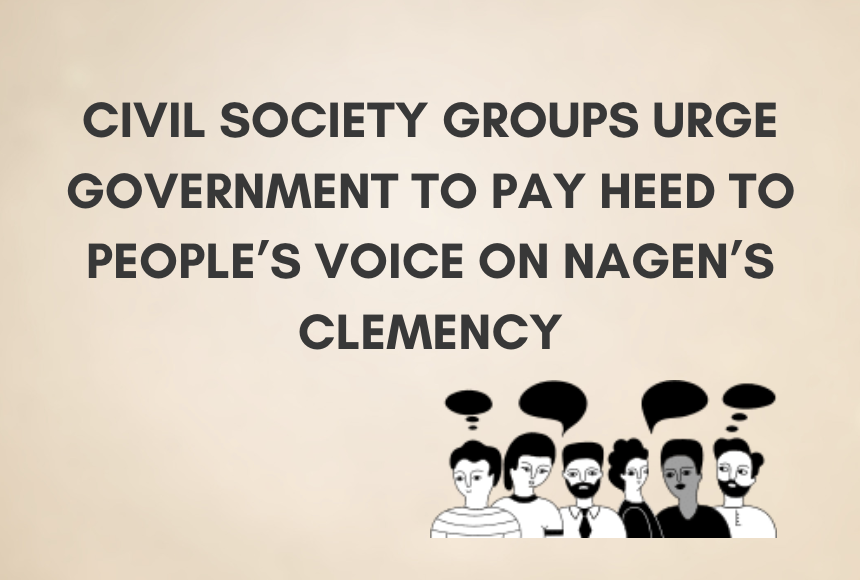In the past many months, we have seen an unprecedented number of Singaporeans calling for clemency to be granted to Nagaenthran a/l K Dharmalingam, a 33-year-old Malaysian national with intellectual and psychosocial disabilities, who is on death row in Singapore. We have also seen many local, regional and international organisations calling on the Singapore government to review the use of the death penalty, and seriously consider abolition.
Nagaenthran’s case has captured ordinary Singaporeans’ imagination and moved them to speak up. Campaign efforts to save his life have not been taken up solely by a small group of anti-death penalty activists, but across a wider cross-section of our society — constituents the government must not ignore in a democratic society. Almost 100,000 people have signed a public petition to spare Nagaenthran’s life. His case has triggered intense civic engagement, media coverage and political attention in Singapore and beyond. Those who have spoken up against Nagaenthran’s execution include:
- United Nations experts;
- the Yang Di-Pertuan Agong of Malaysia;
- the Malaysian Prime Minister;
- the diplomatic missions of the European Union member states and of Norway and Switzerland;
- disability rights activists;
- healthcare workers, social workers and counsellors;
- family members and friends of prisoners who are or have lived on death row;
- drug users, ex-drug users and their loved ones;
- members of the arts community;
- members of the legal profession;
- members of the healthcare and social service sectors;
- environmentalists; and
- Almost 100,000 members of the public who have signed a petition addressed to the President Halimah Yacob.
Besides the individuals and communities listed above, regional and international organizations such as the International Bar Association, ASEAN Parliamentarians for Human Rights, Harm Reduction International and the American Psychological Association (APA), have rallied against the execution of Nagaenthran and others on death row in Singapore.
The sheer number of appeals from a diverse array of groups and individuals who have stood up against the use of the death penalty for Nagaenthran speaks volumes. It is clear that many in Singapore and around the world have seen fit to mobilise themselves to articulate their disagreement over the use of the death penalty, particularly against someone who is as vulnerable as Nagaenthran. The use of the death penalty against Nagaenthran — along with the reality that most people on death row in Singapore are from socioeconomically marginalised communities and belong to ethnic minority populations — has also made many question whom in our society the death penalty really protects, deters and punishes.
As civil society groups in Singapore, we believe that when the people speak, the government must listen, and be willing to make changes that reflect the shifting will of the people. It is not long ago that the death penalty was a relatively taboo subject in our public discourse. The mobilisation of so many in such a short period of time, despite a culture of generalised fear and self-censorship when it comes to critiquing such laws and policies, should prompt a responsive government to seriously consider a re-examination of our drug regime and the use of the death penalty.
It would be a huge step backwards for our society and our political culture if the government ignored the clear and persistent pleas that Singaporeans have made to spare Nagaenthran’s life, and went ahead to execute him. We understand that many others on death row are also facing impending execution in the coming months. We urge the Cabinet to advise President Halimah Yacob to grant Nagaenthran clemency and facilitate evidence-based, progressive policy reviews that engage the public in free and informed discussions around drug policies and the death penalty.
As groups that work towards dignity, social justice and human rights for all people in Singapore across gender, race, sexuality, immigration status, disability and more, we believe that vulnerable communities such as the ones Nagaenthran belongs to deserve greater access to social support, welfare and resources; that everyone deserves access to decent jobs, decent wages, and a meaningful opportunity to lead full lives; and that we must reduce inequality in our society. We believe that these are the most effective crime prevention and drug control strategies.
As civil society groups, we are heartened by the vibrant and impassioned calls for justice for Nagaenthran. Active engagement with social and political issues is a sign of a maturing society that is claiming its freedoms of expression. Singaporeans are demonstrating that the identity and future of Singapore is one that we all can shape, and that questions of justice are not simply left up to lawmakers and courts to determine, but need to include all our communities. Nagaenthran’s story has raised many important issues, including how we uphold due process, the treatment of vulnerable accused persons, the death penalty, the clemency process, and our highly punitive approach to drugs. It will be a huge missed opportunity if the government does not respond by engaging the people, listening to them and heeding their demands.
Signatories:
- The Necessary Stage
- Your Head Lah!
- We Who Witness
- My Queer Story
- SG Mental Health Matters
- A Good Space
- No Readgrets Book Club
- Penawar
- SafeNUS
- New Naratif
- Wake Up SG
- Transformative Justice Collective
- CAPE – Community for Advocacy and Political Education
- End Female Genital Cutting Singapore (EFS)
- Cassia Resettlement Team
- IndigNation SG
- SPARK (Society for the Promotion of ADHD Research and Knowledge)
- Sayur Story
- HOME (Humanitarian Organisation for Migration Economics)
- MaidForMore
- CARE (Culture-Centred Approach to Research and Evaluation)
